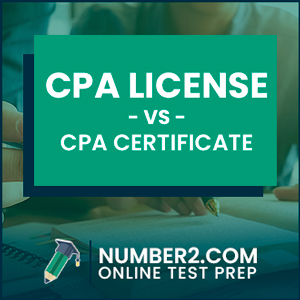 It’s very easy to confuse a CPA certificate vs a CPA license. In most cases, people use them interchangeably. However, the two terms are very distinct. Each credential gives the holder different legal abilities and career opportunities.
It’s very easy to confuse a CPA certificate vs a CPA license. In most cases, people use them interchangeably. However, the two terms are very distinct. Each credential gives the holder different legal abilities and career opportunities.
Both CPA certificates and licenses are important, however. You will need to get both on your journey to being a licensed CPA.
A CPA certificate is issued by most states as a notification that you have passed the CPA exam and have met minimum exam requirements. This certification gives you no legal authority or ability to practice publicly.
A CPA license is also issued by states once candidates pass the CPA exam and fulfill the local licensing requirements like CPE and work experience. A license gives CPAs the ability to practice accounting, tax, and auditing publicly along with other benefits.
In this article, we’ll discuss the differences between CPA certification and CPA licensure to see which is right for your career path.
What’s the difference between a CPA License and CPA Certificate?
Each state governs the process of completing a CPA certificate and CPA license slightly differently, but there are several common differences between the two accounting certifications among all states.
Here are the main differences between a CPA license and a CPA certification:
| CPA License | CPA Certificate | |
|---|---|---|
| Work Experience Requirements | The CPA license requires that you have 1 – 2 years of working experience that is supervised and vetted by a licensed CPA. | For the CPA certificate, you don’t need any work experience to take the exam. |
| Professional Duties | Sign & file tax returns, represent clients in front of the IRS, and perform audits | Cannot sign & file tax returns, represent clients in front of the IRS, and perform audits |
| Professional Titles | You can officially use the ‘CPA’ title | You can’t use the title on legal documents, at least. The work you can do with the CPA certificate is also very limited. |
| Continuing Education Requirements | You’ll need to complete CPE hours every reporting year (you must have at least 120 hours every three years), while also needing to renew your license every year. | You don’t need a CPE (Continuous professional education) |
| International Career Opportunities | You can work in anywhere | Some states allow and recognize you as CPA, but you can’t work in public practice. |
What is a CPA Certificate?
A CPA certificate is a certification that CPA candidates receive upon passing the four-part CPA examination. It is simply an acknowledgment that one fulfilled eligibility requirements, took the test, and passed it.
CPA Certificate Advantages
To attain the CPA certificate, there is no work experience required. One only needs to prepare adequately and pass the uniform CPA exam. It also requires a small fee.
CPA Certificate Disadvantages
A CPA certificate comes with limitations on what one can do. For instance, the certificate does not give one the right to sign tax returns on behalf of people. Similarly, one cannot edit reports, let alone use the CPA title on any official legal document.
CPA certificate holders cannot own or be a partner in a public accounting firm.
While some states allow CPA certificate holders to use the CPA designation in unofficial documents, like signing with the initials CPA, other states do not allow this.
What is a CPA License?
A CPA license is a permit for practicing as a certified public accountant in a state. Accountancy boards in each state issue such permits upon applicants attaining the CPA certificate and obtaining additional requirements.
Advantages of a CPA License
- CPA license holders can use the CPA designation in official and non-official settings
- A CPA license holder can open a CPA firm or become a partner in another firm.
- A CPA license holder has the legal right to sign tax returns as well as carry out audits.
Disadvantages of A CPA license
- A CPA license requires at least 1- 2 years of relevant accounting experience under a CPA
- The licensure process in most states requires at least 40 hours of continuing education for renewal each year.
- A CPA license comes with a significant renewal fee each year for renewal.
CPA Licensure: One-Tier vs Two-Tier States
Each State in the US sets different requirements that candidates must meet to become licensed and maintain their CPA licenses. These requirements are typically very stringent and costly. Thus, some states allow candidates to choose between different levels of certification that require lessor continued maintenance requirements.
Two-Tier States
Some states offer a two-tier licensing system. In these states, first issue CPA candidates a certificate upon successfully completing the CPA exam. These candidates are then considered certificate holders.
These certificate holders then must complete a second round of qualifications in order to become licensed including work experience, ethics examinations, and professional continuing education. Without completing these final steps, candidates will not be fully licensed.
Certificate holders will not be able to practice public accounting until they become fully licensed.
One-Tier States
Most states have done away with their two-tiered approach and have since changed the terminology to apply to different levels of licenses.
For example, a licensed CPA may choose to “downgrade” his license to a certificate because he no longer needs to practice publicly and doesn’t want to fulfill the continuing education requirements associated with a full license.
CPA Licensure Levels: Non-reporting and Inactive
Different terms are used to describe CPA license status in the US. Some of the commonly used terms include active, inactive, practice, registered, inactive with experience, and non-practicing.
Inactive or Non-Practicing CPA License
An Inactive or non-practicing CPA license designation refers to CPAs who were fully licensed at one point and have downgraded their license to an inactive state because they do not actively engage in practice. Depending on the jurisdiction, inactive CPAs are not required to fulfill CPE requirements. Besides, such persons don’t have to pay license fees regularly.
None-practicing CPAs can switch their licenses into a certificate; therefore, avoid paying any renewal fee or maintain 40 hours of continuing education.
For instance, a licensed CPA who works as an accounting professor can downgrade his license to a certificate, as he only teaches and does not perform audit or tax functions. In this case, they can maintain the CPA title even though not practicing.
If this professor ever decides to go back to public accounting, he can reapply to a CPA license and reactivate his inactive certificate.
CPA Certificate vs. CPA License
While each state in the US has different requirements to become a licensed CPA, the procedure of attaining a CPA certificate is often the same. Attaining a CPA certificate is straightforward as one only needs to fulfill basic education requirements to sit the exam. Passing the Uniform CPA always guarantees one of the CPA certificates.
When it comes to CPA licenses, states deploy different procedures and requirements that people must fulfill for licensure. While in tier-one jurisdiction, one only needs to pass the CPA exam, in tier two, prospects have to pass the uniform exam, the ethics test and accrue sufficient work experience for licensure.
While a CPA license is a permit to practice as a public accountant, a CPA certificate is not. A certificate only shows one has taken the uniform exam passed. Only after completing designated requirements can a CPA certificate license holder become licensed.
CPA Certification vs CPA License for International Students & Candidates
International candidates can obtain CPA certificates and become licensed in the US in certain states. However, unlike US nationals, the process of licensure is pretty much complicated. For instance, international candidates must meet education requirements and ensure their credentials are from accredited institutions.
An accrediting agency must evaluate the education credentials before submission to the State Board. The application process starts with selecting a US jurisdiction and then contacting the State’s accountancy board to obtain application materials. All documents must be filled and submitted, followed by the required fees. Once an application is approved, one should schedule an exam, take it, and pass.
Upon passing the exam, international students should follow the stipulated licensure process to obtain a CPA license. The process includes ensuring all academic credentials are ascertained and accredited. In some states, one must take the Ethics test and show proof of a certain amount of work experience.
Once a license application is approved, one can practice as a certified public accountant in the State.
Should You Become a License Certified Public Accountant?
Becoming a full-blown licensed CPA is one of the best decisions you will make in your accounting career. Opportunities for licensed CPAs are many, unlike CPA certificate holders.
A CPA licensee can pursue various accounting, tax, and auditing career that aren’t available to non-licensed accountants. It’s also estimated that CPAs earn $1M+ than their non-certified accountant counterparts over the course of their careers.
It’s good to be a Certified Public Accountant.
FAQ
What does CPA mean certificate?
A CPA certificate is an accounting credential that states issue to CPA candidates who have passed the CPA and completed the minimum requirements. This is not a legal designation and does not give the certificate holder that ability to practice public accounting.
How important is a CPA certification?
The CPA certificate is important because it gives holders the ability to apply for a CPA license. With a CPA license, accounting professionals can sign tax returns, represent clients in front of the IRS, and a number of different financial activities.

